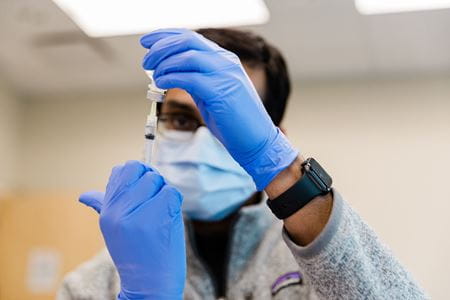Frontline health care workers are expected to get the first doses of the Pfizer vaccine for COVID-19 this week, and more people will be able to get vaccinated in the weeks and months to come. Chances are, these vaccines may be administered by an Indiana University medical student.
Health officials for the State of Indiana called upon Indiana University School of Medicine to train a volunteer army of students who will be on-call to administer vaccines. Within two weeks of the ask, more than 430 medical students had answered that call. Another 209 IU nursing students signed up to support this large-scale vaccination effort.
“For our generation, this is one of the bigger crises that we’ve faced in our time,” said first-year medical student Brandon Toliver. “Short of enlisting in the military in the midst of a potential world war, this is the next best thing. We can change the tide in something that has affected everyone’s life so much.”
It’s not the first time IU medical students have stepped up to serve during the COVID-19 crisis. Early on in the pandemic, Gov. Eric Holcomb issued a request for help in the form of an executive order allowing fourth-year medical students to graduate early and join the frontlines. More than one-third of the Class of 2020 did so.
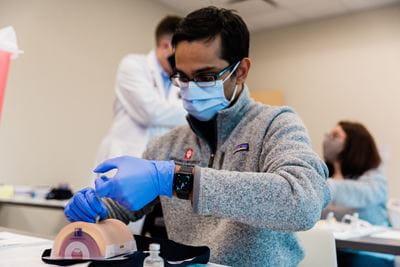 This time, it’s primarily first- and second-year medical students who are coming forward to volunteer, eager to help during a time when classes have been moved online and opportunities for clinical interactions are limited.
This time, it’s primarily first- and second-year medical students who are coming forward to volunteer, eager to help during a time when classes have been moved online and opportunities for clinical interactions are limited.
“I’m not surprised that so many of our students volunteered,” said Jay L. Hess, MD, PhD, MHSA, IU’s executive vice president for University Clinical Affairs and dean of the School of Medicine. “Like so many people, they’re very eager to help where they can. They know that with the surge we’re having in COVID cases, health care workers are very busy taking care of patients. This is something the students can do that is really important work, and ultimately, they’ll be saving people’s lives.”
After completing online training on how to administer intramuscular vaccines from the Centers for Disease Control (CDC) and the American Pharmacy Association, Toliver and other student volunteers practiced the technique on manikins in the Simulation Center at Fairbanks Hall on the IUPUI campus.
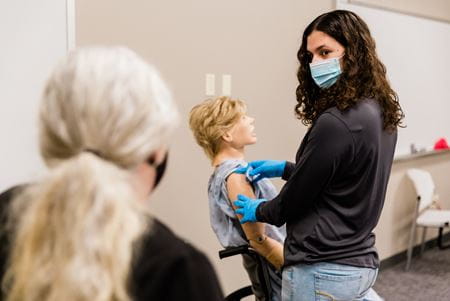 Because IU School of Medicine has nine campuses and clinical partners statewide, it is able to train and mobilize its volunteer army quickly to provide vaccines where needed.
Because IU School of Medicine has nine campuses and clinical partners statewide, it is able to train and mobilize its volunteer army quickly to provide vaccines where needed.
“It’s not just IU Health. It’s about how we can help all health systems,” Hess said. “We have nine campuses around the state that are part of the School of Medicine. Students are already in those communities working in many different health systems, so they’re really well positioned to go wherever those vaccination sites are established statewide.”
“We are proud that so many of our students have stepped up to volunteer and participate in the administration of this life-saving vaccine,” said Paul Wallach, MD, executive associate dean for Educational Affairs. “Participating in this vaccination program will be something that these future physicians will remember during their entire career.”
Lest anyone be wary about a medical student administering their COVID-19 vaccine, Dylan Cooper, MD, who directs the Simulation Center, assures that student volunteers have been thoroughly trained to give intramuscular vaccines, which would include the COVID-19 vaccines manufactured by Pfizer, Moderna and others.
“As an emergency medicine doctor, I’ll be one of the first to get the vaccine, and hopefully it will be given to me by a medical student,” said Cooper, a professor of clinical emergency medicine. “I’d be happy to have any of them give me a vaccination.”
The students took their training very seriously, he added.
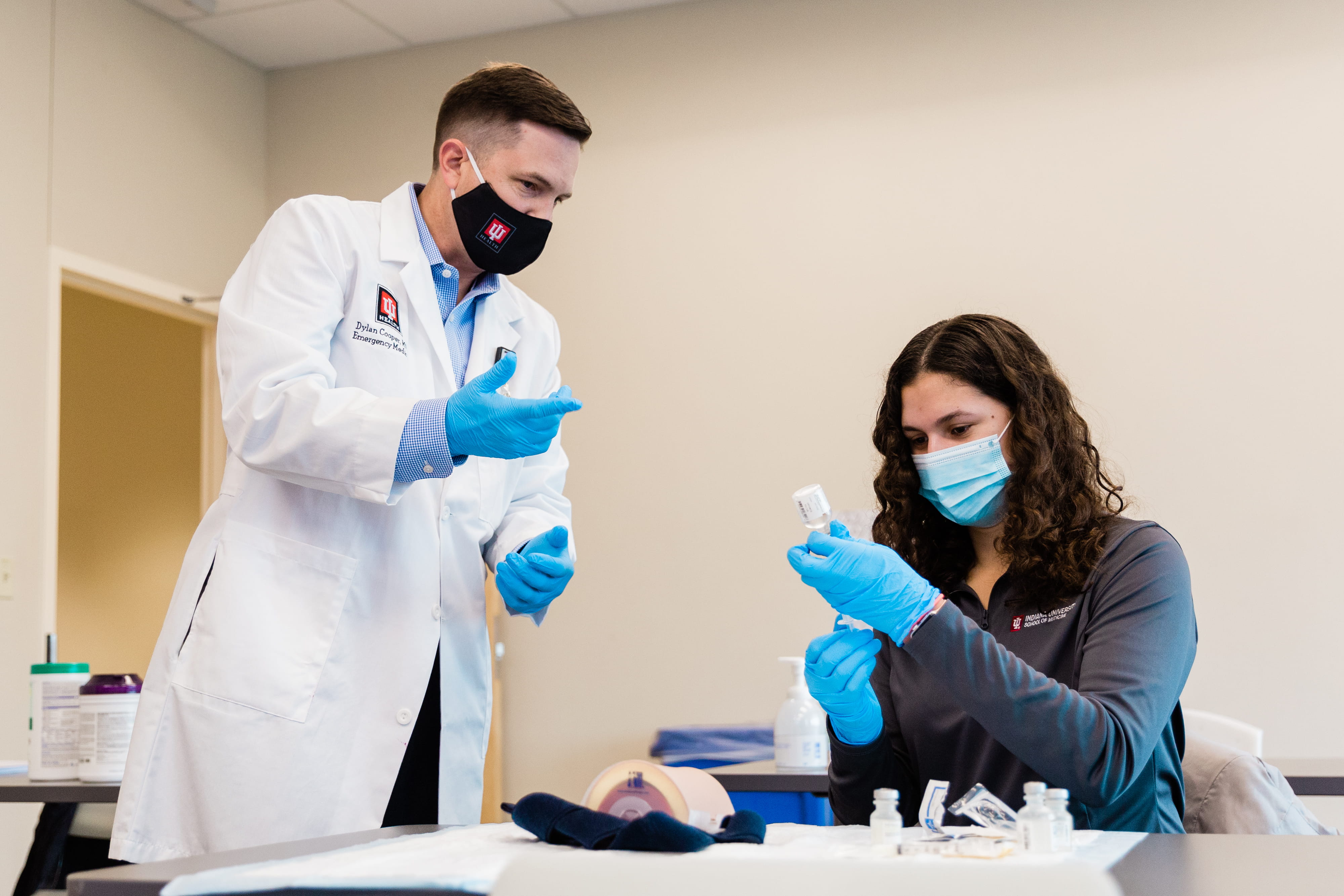 “This is a very valuable vaccine; they feel a lot of responsibility and don’t want to waste a drop,” Cooper said.
“This is a very valuable vaccine; they feel a lot of responsibility and don’t want to waste a drop,” Cooper said.
In a non-pandemic year, first-year medical students normally would not have the opportunity to administer vaccines. Their clinical experience would consist largely of taking patient medical histories or conducting physical exams.
“Even though we would prefer to have these students more involved in clinical medicine during the first two years of medical school, it is actually an incredible opportunity to be able to participate in this vaccine administration program during the pandemic,” Wallach said.
Lana Dbeibo, MD, director of vaccine initiatives at IU, assistant professor of clinical medicine at IU School of Medicine and director of infection prevention at IU Health Methodist Hospital, is in charge of the student volunteer program, which involves training and connecting these student vaccine administrators to health care systems across the state.
“Students can volunteer in multiple places and counties depending on the need,” Dbeibo said.
She was amazed at the number of medical students who answered the call to administer COVID-19 vaccines as they become more widely available to all Hoosiers in the months to come.
“I can’t tell you how heartwarming it is to see these students eager to volunteer and help in the biggest public health crisis of our time,” she said. “They have demonstrated that they are capable of rising up to the challenge.”
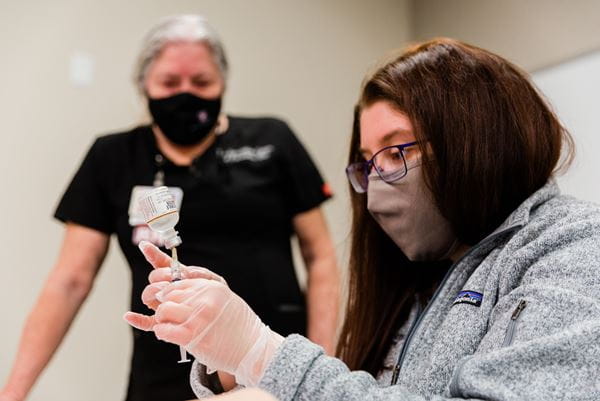
On December 9, Holcomb said “the state of Indiana is on fire,” referring to the number of counties in the “red” category for community spread of COVID-19. He ordered hospitals to cancel or delay elective surgeries from December 16 to January 3 so more staff and space can be devoted to the rapidly rising number of COVID patients.
“There are times when you have to run towards the fire instead of running away. That’s kind of what we do. Not recklessly, but we do run into the burning building sometimes,” Hess said of those in the medical profession. “We have a duty to care, and at times it’s hard, but that’s part of what we signed up for. The pandemic has reminded people why they went into medicine and that lives are at stake, and what we do is incredibly important.”
There are nearly 7 million people in Indiana, and “we need to get as many as possible of them immunized as fast as we can,” Hess added. He urges everyone to get a COVID-19 vaccine as soon as it becomes available to them.
“The vaccine is much more effective than the flu vaccine is at preventing infection, and what’s maybe even more important, it’s very effective at preventing severe COVID-19 infection,” he said. “This is going to save a lot of lives.”
